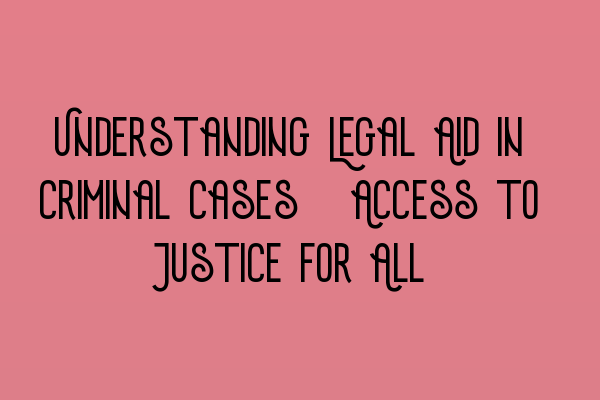Understanding Legal Aid in Criminal Cases: Access to Justice for All
When it comes to criminal cases, having access to competent legal representation is crucial. However, for many individuals who cannot afford the high costs of legal fees, accessing justice can be challenging. This is where legal aid comes into play.
Legal aid is a government-funded scheme that provides financial assistance to individuals who are unable to pay for legal representation. It ensures that everyone, regardless of their financial circumstances, has access to legal services. In criminal cases, legal aid aims to ensure that defendants have a fair trial and can effectively navigate the complexities of the legal system.
What Does Legal Aid Cover?
Legal aid covers a wide range of legal services in criminal cases. It includes:
- Legal advice and assistance during police investigations
- Representation at court hearings
- Preparation of the defense case
- Representation during the trial
- Appeals against convictions
It is important to note that legal aid is means-tested, meaning that it is only available to those who meet certain income and asset thresholds. The exact eligibility criteria vary depending on the jurisdiction.
Importance of Legal Aid in Criminal Cases
Legal aid plays a crucial role in ensuring access to justice for all. Without legal aid, individuals facing criminal charges would be at a significant disadvantage. They may not have the knowledge, skills, or resources to effectively defend themselves in court.
By providing legal assistance and representation, legal aid ensures that defendants can exercise their rights, have a fair trial, and present their case effectively. It helps to level the playing field and prevents injustices that may arise due to a power imbalance between the prosecution and the accused.
In addition to its role in protecting the rights of individuals, legal aid also contributes to the overall fairness and integrity of the criminal justice system. It helps to uphold the principle that everyone is entitled to a fair trial, regardless of their financial situation.
Obtaining Legal Aid
To obtain legal aid in a criminal case, individuals need to meet the eligibility criteria set by the relevant jurisdiction. They typically need to provide proof of their financial circumstances, including income, assets, and any dependents.
If eligible, individuals can apply for legal aid through the appropriate legal aid agency or organization. The agency will assess the application and determine whether legal aid should be granted based on the merits of the case and the financial circumstances of the applicant.
It is important to seek legal advice as early as possible to determine if you qualify for legal aid. A qualified criminal defense solicitor can guide you through the process and help you understand your rights and options.
Conclusion
Legal aid is a vital component of ensuring access to justice for all individuals, regardless of their financial circumstances. It provides necessary legal representation and assistance to defendants in criminal cases, safeguarding their rights and ensuring a fair trial. If you require legal aid in a criminal case, consult a reputable criminal defense solicitor who can help you navigate the process.
For more information on related topics, feel free to check out these articles:
- SQE 1 Practice Exam Questions
- SQE 1 Practice Mocks FLK1 FLK2
- SQE 2 Preparation Courses
- SQE 1 Preparation Courses
- SRA SQE Exam Dates
